The Italian sprints coach feared he may have to give up the job he loved, but going all in with British talent Amy Hunt has paid off - and brought success on the world stage.
Marco Airale doesn’t like to watch his athletes’ major races from the side of the track. Instead, he prefers to linger in the stadium warm-up area. It’s where you’ll find a lot of sprint coaches during the big moments and this was the biggest of the 34-year-old’s coaching career to date.
As the announcer introduced the competitors for the women’s 200m final at the world championships in Tokyo’s national stadium, the Italian let his mind wander. He thought back to December, when he had hit “the bottom” after a day in which two of the high profile British athletes he coached – Olympic 100m and 200m finalist Daryll Neita and then European U23 100m champion Jeremiah Azu – left his training group at the same time, telling him of their decision via WhatsApp messages and cutting the income of his business by “almost 50 per cent” at a stroke.
He thought of his father, who had fallen seriously ill and had just undergone surgery, only making it home in time for the day of the women’s 200m heats. And he thought of his athlete who was about to perform. Amy Hunt was the sole British member of the group who had stuck by him after that darkest of days – “she committed fully,” he says – and now, just a matter of months later, they both stood on the brink of something special.
Airale had gone all in to get his athlete to this point. The stakes were high.
“This was my last dance,” he says. “I met with my staff not long after the athletes left and I put a presentation on the TV. The first slide was a picture of Michael Jordan and The Last Dance [the famous Netflix sports documentary].
“I promised myself to finish the season and to try my best. I told all my athletes: ‘Guys, let's finish the world champs and see who wants to stay’. If I didn’t have enough athletes or the season hadn’t gone well, I would have stopped and done something else, because [continuing] would have been impossible.”
He adds: “I knew I couldn’t [afford to] miss. I knew that every session had to be planned very well, every treatment had to be perfect.”
And it was. Throughout the entirety of this season, Hunt didn’t miss a single training session. She had done all of the work but, now, Airale could only stand and watch.
“They got out, got to 100m, she was in a good position and then she did the magic,” he beams. “The race is a reflection of the season. Not a great start but, trust me, we're coming.”
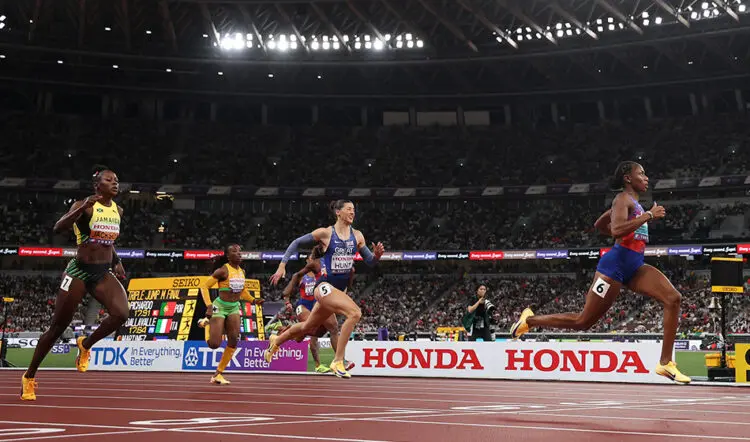
Hunt had indeed been behind – in sixth place to be precise – coming off the turn but her big strength is her straight line speed. With Melissa Jefferson-Wooden flying and already well on her way to gold, there were other podium places up for grabs and all of that work, all of that sacrifice, was channelled into the closing metres. When she hit the line, the Englishwoman knew she had won a medal. When she was confirmed as having come second, she leapt with joy. A similar scene was playing out elsewhere.
“I just exploded,” says Airale. “I destroyed everything in the warm-up area. I threw the barrier, I threw chairs…”
That reaction would have already been understandable, given that the performance represented a first individual global medal for a member of his group. But it makes even more sense when you consider the low point from which the campaign started.
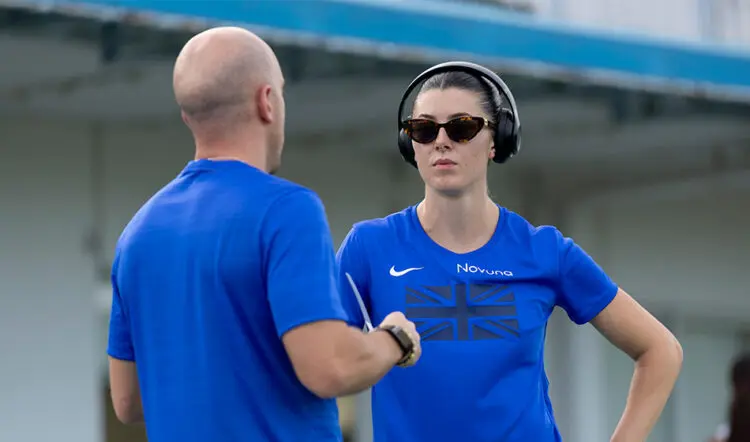
Airale is speaking to AW on the final morning of the championships at a Tokyo hotel teeming with international athletes and support staff. Even with the bulk of his work done for this trip, he is still a very busy man and is contemplating the schedule of lectures he has in place in the coming weeks.
There won’t be much rest for him – he is taking work opportunities when they come. Given what happened last winter, job security is a concept with which he is not particularly familiar.
The former triple jumper is recounting the December day he will never forget. It had been time for the training squad he coaches in the Italian city of Padua to continue building for the months that lay ahead. There were European and World Indoor Championships in the calendar, as well as the climax to the outdoor season – the World Championships in Tokyo – to aim for.
To his mind, he was approaching it all from a position of strength. His sprints group was making real progress and going so well, in fact, that he had just hired five new members of staff to help. Brands were starting to show an interest in investing. Excitement was in the air.
That bubble was well and truly burst, however, one morning as the phone messages arrived in quick succession just before training was due to begin. There had been a significant British contingent to the squad – chief among them Neita, whom Airale had guided to fourth and fifth places in the Olympic 100m and 200m finals respectively last year. But suddenly it evaporated. Neita announced she was leaving. So, too, was Azu.
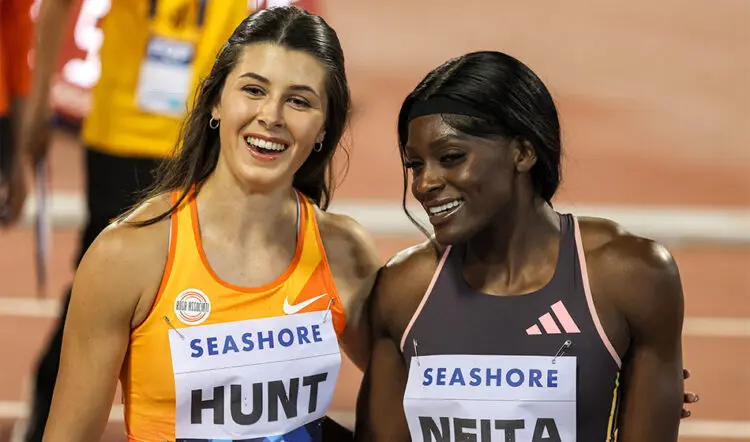
“I truly thought it was a very good season last year,” says Airale. “I was coaching an athlete whose best place in a major competition before coming to me was eighth at the Olympics in the 100m. I thought I did a good job. I still believe that I did a good job from a coaching perspective.
“Remember that we are a private group. We have no funding, no federation, no brand, no university, no club. It's only me with the training fee of the athletes [for income] so it’s hard. Based on what the athletes needed, I made a lot of investment, especially on the staff side. We started the season, everyone committed and then, before practice in the space of a few hours, the athletes left.”
All of a sudden, Airale found himself with a full-blown crisis on his hands. It had only been in the aftermath of the Tokyo Olympics in 2021 that he had decided to start his own coaching group and already he was making a name for himself. But to see established athletes leaving all at once, regardless of the fact that he had no idea why, starts to change that perception.
“It was really unexpected,” he adds. “They left at the same time, and without knowing the true reasons why they did it is hard, especially in track and field, which is a small world.
“You start to see the headlines and it also started to put a lot of pressure on Amy, because she was the only one [of the British athletes] who decided to stay. Everyone started to ask: ‘Are you staying? You're the only one there. Is everything okay?’.
“If x amount of athletes leave it’s [always seen as being] the fault of the coach. Something happened, and it's the fault of the coach. And this is what we've been through
the whole season. So the fact that Amy decided to still commit was a big plus, because it was not easy.
“So we started but December was really bad. We didn't get any help from anyone. We had brands that were interested in funding us but they retired the offer because they saw people leaving. I was supposed to also get funding due to the Olympics from some federations, but then they said it was related to the athletes, so we were also going to lose that funding, too.”
Despite the bleak outlook, however, rather than admit defeat Airale decided to double down and devote himself to this last dance.
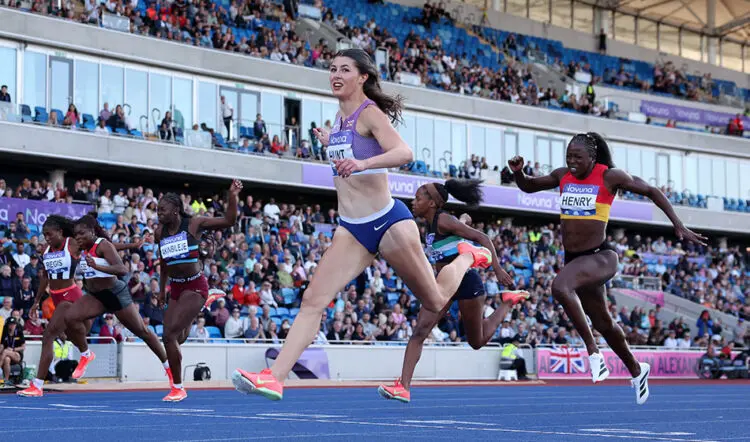
“I kept the staff, took the savings I had and I said: ‘Okay, I'm going to commit no matter what. I'm going to finish the season, see how it goes and then, if it's not meant to be, I'm going back to my regular job as a physio in a hospital’.”
One of the most difficult aspects to the athlete departures at that time was that lack of an explanation as to why they had chosen to go.
“For me, especially as an Italian, we are very passionate and very family orientated,” says Airale. “I would have liked to have had a face to face conversation. When other athletes left my group, they always came and sat down and had an honest conversation.”
That conversation has since taken place with Azu, while another British member of the group – Adam Gemili – left on good terms at the end of last season. With Neita, Airale was told that her departure had been connected to a desire to spend more time with her family in London – though that logic didn’t quite seem to stack up when it was then announced that she was moving to Florida to work with
Lance Brauman.
“I remember I went straight to Amy and said: ‘This is what has happened. I don't know if you know, but I think that all the GB athletes are leaving’,” recalls Airale. “She said: ‘No, I didn’t know anything but don't worry. I'm staying’. She was even asking me if I was okay and then she asked: ‘Are we training?’. I said: ‘Yes, no worries. Now we’ve got strength’.”
By this point, Hunt had been living and working in Italy for a year. Just hours after she had graduated with an English Literature degree from Cambridge University in 2023 – a feat which had proved to be hugely stressful and difficult to balance with elite athletics – she had boarded a plane and set off for her new life in the city that lies around 40km to the west of Venice.
“I’ve always trusted Marco,” the now 23-year-old tells AW. “We’ve always had a very shared vision and projection of what the future will look like. We’re always on the same page.
“It’s been incredible to have him on this journey with me.”
She has also had her low points to navigate. In 2019 Hunt created quite a stir by breaking the world under-18 200m record with a run of 22.42 and, as she began her university career, Vogue magazine even named her as one of the “faces to define the decade”.
Pushing herself both academically and within her sport, however, caused issues with her mental and physical health and, after an illness-plagued 2021 season, she ruptured her quadriceps competing indoors in early 2022 – an injury that required surgery.
Airale was at that race and it was a year later that he was approached by UK Athletics’ Head of Sprints and Relays Darren Campbell about making an addition to his Italian set-up.
“Darren came and said: ‘I would like you to consider having her in the group. She's going to be done at Cambridge, she’s had some tough years at uni and she's coming back from an injury, but she's a raw diamond and I think you're the one that can shape her to be very good’. She came over and fell in love with Italy. She found a very good spot to live and she is the one who committed 100 per cent to the programme.”
The first year was spent getting Hunt strong and balanced once again but, even in the midst of all that, it didn’t take long for the partnership to bear fruit. A few weeks after joining Airale, Hunt returned to Britain and clocked 11.13 seconds over 100m in Stratford – a huge personal best at the time that came 1547 days after running her previous best mark of 11.31.
“Last year was a tough year for her, because we worked very hard and her body was still adapting to the new programme,” says Airale. “But she’s professional in everything she does and, of course, she was training with someone she was looking up to, one of the fastest Brits ever. It was hard for her but she put the work in and she never complained.”
A look back at her results this year highlights just how Hunt has built momentum from the indoor season onwards. She has raced a lot this year, beginning with a series of confidence-boosting 60m outings that saw her PB come down to 7.09 and reach the final at both the European and World Indoor Championships.
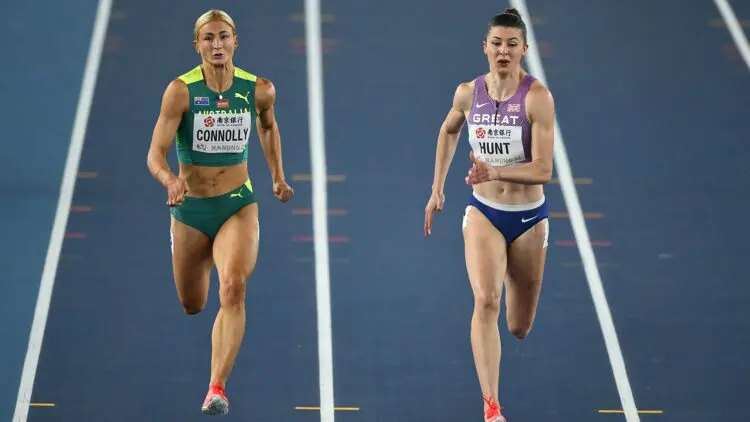
“I explained to her exactly how the season would go and she listened,” says Airale. “I told her: ‘We need to work during the indoor season because my programme develops acceleration first, so we can't peak for the indoors and you're not going to be in your best shape [then], because I don't need you to peak for the indoors’. This has always been my philosophy.
“She is one of the easiest athletes I've worked with. As coaches, we sometimes forget that we are not the one running. We are here to guide the athletes towards their dreams.
“The athletes here are all talented but it's not Marco that won the silver, it’s Amy. Marco was the one guiding her. But if you don't let your coach guide you, it’s pointless.
“She sacrificed a lot, but never complained. There were decisions made during the season that I could see were a sacrifice for her but she just said: ‘Okay’. She committed fully.
“If she didn’t make the final, it was my fault. I always tell the athletes: ‘If you do the 101 per cent then it’s my fault. But if you do 99 per cent, maybe you missed something’. Amy is the first one that looked at the full picture.”
More encouragement followed at the London Diamond League, where an important landmark was reached. “She knew that, to be the new Amy, she needed to get rid of the 22.42 [as her PB],” says Airale. “She finally made it in London [with 22.31].”
That personal best came down further to 22.14 at the beginning of August with her photo finish defeat to Dina Asher-Smith at the British Championships. Hunt matched that time exactly at the semi-final stage in Tokyo to automatically qualify for the 200m final. Just as in the heats and the semis, once again she was drawn in lane five.
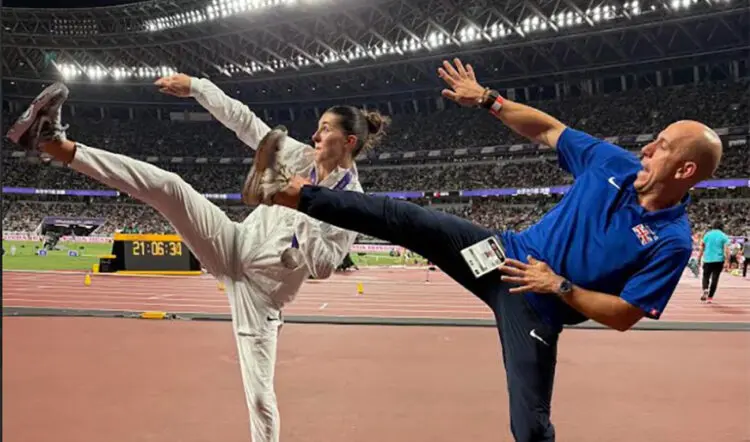
And that brings us back nicely to that fateful evening of September 19.
“I was empty,” says Airale. “I had nothing left because I had put everything I had into [those] 22 seconds. And then the race started. You're just watching and, the closer you get, the more you understand: ‘Maybe I'm going to make it this time’. And when she crossed the line in second…”
Just after Hunt had finished that run of 22.08 is when the the chairs went flying but, as the dust settled, Airale had other things to do.
“I laid on the track. I called my dad. He was crying. I was crying. Then we went into the stadium when it was empty. I sat down in lane five, I took a picture with the blocks and that was it,” he says. “I've been told the whole season: ‘Yeah, he's a good coach, but he can't bring medals’. Well, we can. I know that this will change Amy’s track life. With a Cambridge degree and all of that, even without track, her life would have been a success. But I know that this was a dream that she wanted to achieve and I'm happy that I helped her to get there.
“I'm very happy for the athletes that stayed, the athletes that trusted the programme, because if you actually trust your coach, and you trust the work that he's doing with his staff, then these are the results you get.
“In the end, I actually want to say thanks to the athletes that left. I say: ‘Big thanks. I hope you guys achieved everything you wanted this year. I achieved more than I was expecting and I possibly would not have put so much work in without everything that happened.”
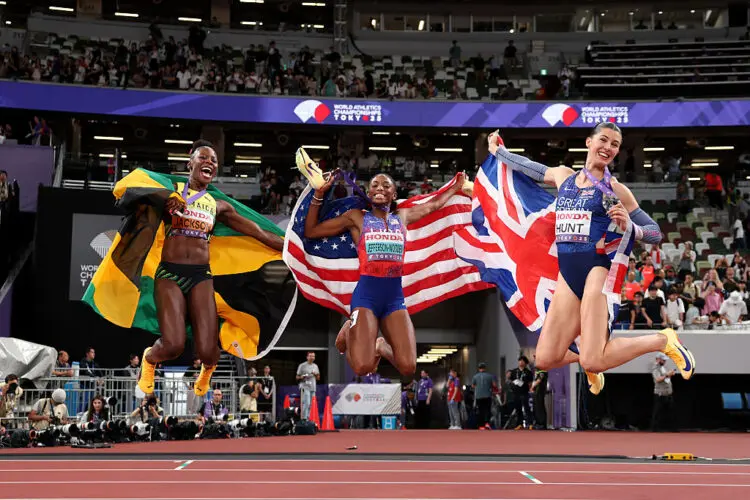
And it won’t be the last dance after all. The training group numbers are healthy and, now, there is a tangible evidence of success.
“I will keep moving forward,” says Airale. “My dream was to be a pro coach. I made it. I can stop right now, and I have already won more than everyone would think. But I know I can be one of the best sprint coaches in the world, and I will prove that. Even if I have one athlete, I'm going to find a way.”
This article also appears in the October issue of AW, out now
